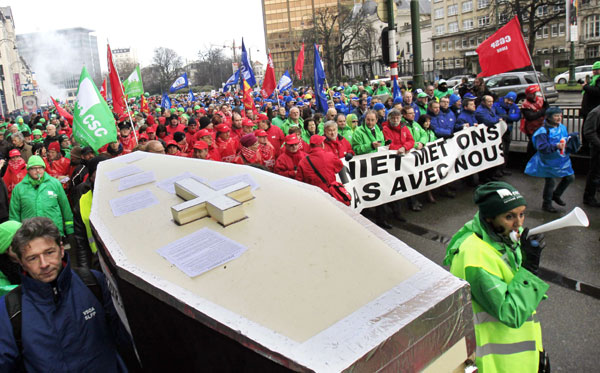Budget, foreign ties top EU agenda
Updated: 2013-02-08 09:18
By Fu Jing in Brussels (China Daily)
|
||||||||
 |
|
Belgian public sector and service workers march during a demonstration through central Brussels on Thursday. Several thousand people protested against Public Services State Secretary Hendrik Bogaert's plan to cut jobs and reduce salaries in the administration, Belgian media reported. [Photo/Agencies] |
European leaders are expected to discuss expanding exports and protecting their internal markets as they put long-term budget and foreign affairs high on the agenda at their summit on Thursday and Friday.
With exports greatly helping the European economy to leave the worst of the financial downturn behind, the bloc's leaders will discuss how to further boost their competitiveness in the global market and compete with the US and export-driven emerging economies such as China.
Analysts said the European Union should not roll out policies simply to boost growth and exports and create jobs, but also encourage two-way trade and investment between China and the EU.
European Commission President Jose Manuel Barroso is scheduled to head the discussion on trade on Friday morning after the leaders of the 27-member bloc reach common ground on their budget plan for the years 2014 to 2020.
In a speech to the European Parliament, Barroso said he will fight hard to preserve the European dimension of the multiannual budget - initiatives like science and research, cohesion and small and medium-size enterprises.
Barroso has also recognized the effect of trade contrition on Europe's economic recovery, saying that in 2012, external demand was the main source of growth for the European economy - almost 1 percent of the EU's GDP and about 30 million jobs that depend on exports.
Barroso referred to recent milestones in this policy, such as the successfully concluded free-trade agreement with South Korea last year and completed negotiations on a pact with Singapore. Talks with Canada should be concluded in the near future, negotiations with Japan will start shortly, and the possibility of such an agreement is being explored intensively with the United States.
"If we are to benefit as fully as possible, we must be proactive and ambitious," Barroso said.
Though Beijing has considered launching a free-trade agreement feasibility study as soon as possible, Brussels doesn't consider an FTA with China a priority.
EU trade spokesman John Clancy told China Daily: "The current focus with our Chinese partners is to make progress toward an investment agreement and further market access.
"Only with positive and concrete developments on an investment deal on both sides will we be in a position to examine broader trade ambitions, such as an FTA with China," Clancy said.
Fredrik Erixon, director of the Brussels-based European Centre for International Political Economy, said real economic integration between the two markets will remain strong in 2013, while growth in trade will be moderate because of falling demand in Europe, and slower growth in China.
"Tensions will continue in selected areas like telecom equipments and solar panels, and there is likely to be some new cases in 2013, brought by China as well as by Europe," said Erixon, adding that they will be contained and both sides now recognize the importance of avoiding an escalation.
Stephen Phillips, chairman of the EU-China Business Association, said China and the EU have great potential in business and trade engagement.
"To realize the full potential, we need politicians and leaders on both sides to help by breaking down barriers to trade and investment while at the same time finding solutions to any tensions that arise in a timely fashion," Phillips said. "What business doesn't want to see is tit-for-tat measures. That doesn't help anybody."
Liu Jia contributed to this story.
fujing@chinadaily.com.cn

 Li Na on Time cover, makes influential 100 list
Li Na on Time cover, makes influential 100 list
 FBI releases photos of 2 Boston bombings suspects
FBI releases photos of 2 Boston bombings suspects
 World's wackiest hairstyles
World's wackiest hairstyles
 Sandstorms strike Northwest China
Sandstorms strike Northwest China
 Never-seen photos of Madonna on display
Never-seen photos of Madonna on display
 H7N9 outbreak linked to waterfowl migration
H7N9 outbreak linked to waterfowl migration
 Dozens feared dead in Texas plant blast
Dozens feared dead in Texas plant blast
 Venezuelan court rules out manual votes counting
Venezuelan court rules out manual votes counting
Most Viewed
Editor's Picks

|

|

|

|

|

|
Today's Top News
Boston bombing suspect reported cornered on boat
7.0-magnitude quake hits Sichuan
Cross-talk artist helps to spread the word
'Green' awareness levels drop in Beijing
Palace Museum spruces up
First couple on Time's list of most influential
H7N9 flu transmission studied
Trading channels 'need to broaden'
US Weekly

|

|







